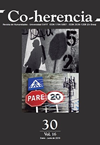Tulio Restrepo: Campo Abierto / Espacio en tránsito
Main Article Content
Keywords
Colombian art, contemporary art, image, urban space, dystopia
Abstract
The work of the artist Tulio Restrepo (Medellín, 1958), shares a trait with local artistic production which has been present since at least the 1970s: the attempt to form an image of the city and the urban in a rapidly changing context, which is hazardous and propitiates anonymity. This paper reviews the series Campo Abierto / Espacio en tránsito (Open field/space in transit), included in this issue of Co-herencia, a set of 20 digitally produced images where subjects about the anonymous condition of pedestrians in the urban space, surveillance and security, visual codes or the fragility of experiences for those who get around the city coexist. To do this, this paper discusses some theories about urbanism in the 1960s and examines the context
in which the artistic production of Tulio Restrepo is produced.
Downloads
References
Delgado, M. (2011). Prólogo. En: J. Jacobs, Muerte y vida de las grandes ciudades (pp. 15-23). Navarra: Capitán Swing.
Harvey, D. (2013). Ciudades rebeldes. Del derecho de la ciudad a la revolución urbana. Madrid:
Akal.
Jacobs, J. (2011). Muerte y vida de las grandes ciudades. Navarra: Capitán Swing.
Lefebvre, H. (2013). La producción del espacio. Madrid: Capitán Swing.
Lynch, K. (2008). La imagen de la ciudad. Barcelona: Gustavo Gili.
Mumford, L. (2014). La ciudad en la historia. Orígenes, transformaciones y perspectivas. La Rioja: Pepitas de calabaza.
Restrepo, T. (2016). Reseña de la obra Campo Abierto / Espacio en tránsito. En: Retrospective, 10 Years MAG3 (pp. 42-43). Vienna: Project room MAG3.
Sassen, S. (2010). Territorio, autoridad y derechos. De los ensamblajes medievales a los ensamblajes globales. Buenos Aires: Katz.




